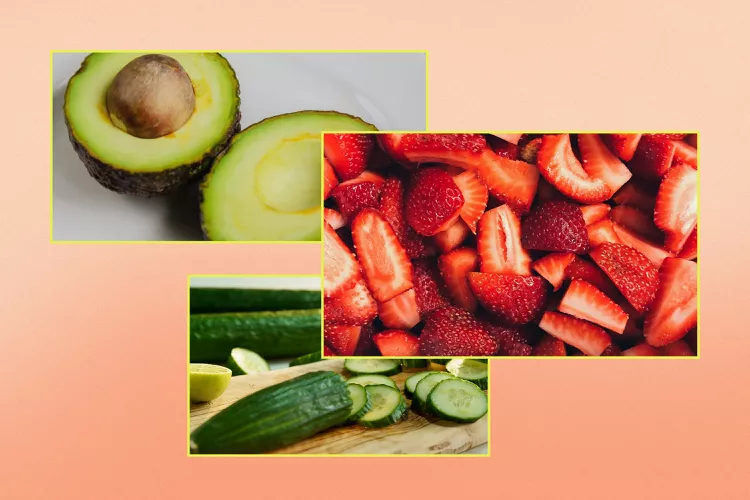It’s the nutrients, not necessarily the specific foods, that you should focus on for radiant skin.
Maybe you’ve heard that ‘you are what you eat,’ or that what you consume on a regular basis affects your outside appearance just as much as your inside health. And if that’s the case, what’s the ideal diet for clear, radiant skin? The truth is, there is not one best food — or even multiple best foods — for glowing skin. However, there are foods that are rich in certain nutrients that may promote glowing, radiant skin. In fact, the skin is the largest organ of the human body and acts as a barrier between the body and surrounding environments, so it’s incredibly important to provide it with a variety of nutrients through food.
“The foods [you] eat and lifestyle [you] live show up on [your] skin,” says Dawn Jackson Blatner, registered dietitian and author of The Flexitarian Diet. “[Your] skin health can actually be a clue about [your] inner health. [You] get entirely new skin about every 40 to 56 days, and the building blocks of that new skin come from the foods [you] eat. So if [you] want healthy skin, one main factor is the quality of [your] diet.” So what is ‘healthy skin’ anyhow? Healthy skin is well-hydrated and maintains a protective layer against germs. Taking care of your skin by applying sunblock, properly cleansing, and maintaining a skincare routine play a large part in healthy skin, but so does your diet.
You may spend a ton on cosmetics, but overlook the fact that diet is a key component of skin health. Glowing insinuates bright, luminous, and lush skin, and there are delicious, nutrient-packed ways to achieve this goal. Learn more about which foods to choose for radiant skin and creative ways to eat them.
What Foods Are Good for Glowing Skin?
There are many ways that nutrition can affect the skin. As you age, hormone levels shift, collagen levels decrease, and the rate of skin renewal and repair decreases. Depending on your exposure to sunlight, aging may progress, increasing the number of reactive oxygen species, decreasing hyaluronic acid production, and increasing inflammation. Choosing foods that contain specific nutrients is important for promoting optimal skin health. Here are eight nutrient-dense foods that research proves to be beneficial for skin health.
Cucumbers
The key to luminous skin is hydration. Water intake is crucial, as the skin is a direct reflection of the body’s moisture levels. Water-rich foods, or foods that have a high water content, are an excellent way to ‘eat your water.’ Cucumbers are an excellent example, as they are 95 percent water.
Eating hydrating fruits and vegetables, such as cucumber, is an excellent way to add to your overall hydration levels, which will in turn promote glowing skin. Do you have chapped lips or dull skin? Focusing on consuming more water will likely reverse that. In fact, research suggests that drinking higher amounts of water (the study suggested 2 liters of water per day) may improve skin physiology. Simply put, drinking more water improved skin hydration.
Other water-rich options: watermelon, lettuce, and cantaloupe
Oysters
Oysters are excellent sources of zinc and other trace minerals (iron, selenium, copper, etc.) that are needed in small amounts in the body. These small, but mighty, minerals are key for promoting immunity and fighting inflammation.
Zinc is necessary to maintain the skin’s defense against infection and promote wound healing. Of all foods, oysters contain the most zinc per serving.
Other trace minerals have skin-protective effects as well. Copper can improve skin elasticity and reduce wrinkles, whereas a deficiency in selenium may make the skin more sensitive to oxidative stress.
Other trace mineral-rich options: nuts and seeds, lentils, and beans
Avocados
Lipids (another word for fats) are an important part of the skin and play a role in maintaining barrier function and membrane structure, promoting repair, and preventing aging. One excellent healthy fat-containing food for skin health is avocado.
“Avocados are rich in monounsaturated fats along with vitamins A and C, which are important for maintaining strong tissues and preventing skin dryness,” says Bonnie Taub-Dix, R.D., creator of BetterThanDieting.com and author of Read it Before You Eat It – Taking You from Label to Table.
One small study looked at 39 females who were randomly assigned to eat one avocado daily or continue their normal diet. The study concluded that daily avocado consumption may result in improved elasticity and firmness of facial skin.
Other healthy fat-containing options: nuts and seeds, olive oil, and fatty fish
Salmon
Fatty acids, such as omega-3s, can also reduce inflammation and provide anti-aging protection. Salmon is a great food to promote radiant skin, as it contains skin-boosting omega-3 fatty acids, as well as protein.
“Fish and foods rich in omega-3 fatty acids help to preserve collagen and keep skin firm,” says Taub-Dix.“Not only are these omega-3s good for your skin, but they’re also heart-healthy.”
Other omega-3-rich options: walnuts, chia seeds, and flaxseeds
Bone Broth
Bone broth may be a trendy beverage, but it’s packed with amino acids (the building blocks of protein), as well as collagen. Protein performs many functions in the body. One of its most important jobs is to construct and repair tissues, as skin is constantly in a cycle of renewal. Consuming enough protein is necessary to create the amino acid pool required by the body to keep this cycle going.
While all types of protein contribute amino acids, one type of protein is of key interest when it comes to skin health. Collagen is found in large amounts in the body. Collagen provides structural support for various tissues in the body, including skin, cartilage, tendons, bones, and connective tissue. Some evidence suggests that collagen supplements may have anti-aging benefits such as reduced wrinkles, improved skin elasticity, and decreased dryness.
Other protein-rich options: eggs, lentils, and nuts
Walnuts
With ample protein, healthy fat, and vitamin E, walnuts are a skin health-promoting powerhouse. Walnuts contain a specific form of vitamin E called gamma-tocopherol, which has been shown to support the regeneration of skin and prevent skin damage. The tasty nut also provides tons of omega-3s, which is perfect for those who don’t like fatty fish.
Other vitamin E-rich options: sunflower seeds, almonds, and spinach
Strawberries
Berries, such as blueberries and strawberries, are excellent antioxidant-rich foods. Antioxidants do exactly what their name suggests: they fight oxidation. In simplistic terms, oxidation leads to aging skin. Many cosmetics contain antioxidants such as vitamin E and vitamin C that you can apply topically to your skin, but food can also work the same way from within the body. “Vitamin C helps promote collagen formation and curtails the effects of free radicals, helping to maintain firm and youthful skin,” says Taub-Dix, R.D. “Strawberries deliciously provide vitamin C while also supplying fiber, a nutrient most of us don’t get enough of.”
Foods that contain antioxidants are also incredibly beneficial to ensure you’re reaping the benefits of these oxidation-fighters inside and out. Some evidence suggests that strawberries can reduce UV damage and reduce inflammation.
- Other antioxidant-rich options: raspberries, Brussels sprouts, and tomatoes
Red Peppers
When it comes to identifying vitamin C-rich foods, oranges are the most common answer. However, one 1/2-cup serving of red peppers contains 106 percent of the daily recommended value of vitamin C, whereas one medium orange provides only 78 percent.
Vitamin C is required for collagen production, protein metabolism, and wound healing. It also acts as an antioxidant, fighting off free radicals and reducing inflammation. What does this mean for the skin? A brighter, more radiant complexion.
Other vitamin C-rich options: oranges, broccoli, and kiwi
How to Incorporate Skin-Healthy Foods Into Your Diet
Implementing these groups of nutrient-dense foods into your diet can be easy and delicious. There are various sources for each nutrient, so you can find options that you enjoy and that meet your nutrition needs. Some ideas include:
- Salads: Incorporate water-rich fruits and vegetables, such as citrus fruits, lettuce, and cucumber into your salads. Add an omega-3-rich healthy fat source, such as avocado and salmon. Punch up the protein with a handful of almonds.
- Smoothies: Make a glowing-skin smoothie by incorporating ingredients from each category, such as antioxidant-rich berries, hydrating spinach, protein and mineral-dense almonds, and your favorite protein source.
- Snacks: Choose a mix of protein, fiber, and fat to boost satiety between meals, while also benefitting your skin. Mix nuts and dried fruit, such as walnuts, goji berries, and coconut flakes. For a savory treat, dip vitamin-C-packed red pepper strips into guacamole.
If you need individualized meal ideas or support, consider consulting a physician or nutritionist to get a personalized recommendation.
A Note on Accessibility
Many of these foods can be on the pricier side, so it’s always an option to opt for frozen or canned varieties where possible. While it may be an investment, these foods also have benefits way beyond the skin. They’re excellent for disease prevention, optimal digestion, and general well-being.
Foods to Avoid for Glowing Skin
In general, all foods fit into a healthy, balanced diet, unless you have specific limitations or allergies. That said, there are some types of food and cooking methods that may not be beneficial for your skin. These include:
- Fried foods
- Fatty cuts of meat (ribs, bacon, etc.)
- High-sugar and highly processed foods
- Foods rich in sodium (processed meats)
- Artificial sweeteners
Some foods, such as dairy products or soy-containing foods, are also thought to be disruptive to skin health, but research is inconclusive. “It’s in question whether certain foods truly harm the skin versus anecdotal evidence from those who experience discomfort, but some people have shown that dairy milk causes acne,” says Taub-Dix, R.D. “If this is the case for you, it’s an easy fix to swap out dairy and sub in a plant-based milk [such as] almond milk.” If soy-containing products seem to wreak havoc on your skin, be sure to look closely at the ingredient lists of packaged foods.
Alcohol and tobacco are also two items to avoid. These substances decrease hydration levels in the skin and may promote aging.
The bottom line is: incorporating these foods into your diet may promote healthy, radiant skin; however, skin health is dependent on many factors. “For healthy, glowing skin you need a holistic approach,” says Jackson Blatner, R.D. “Sure, a quality diet is one factor, but it’s also important to look at your sleep, exercise, stress management, and hydration.” To get glowing, radiant skin, you’ll also want to prioritize drinking plenty of water, looking at your stress management tools, and getting enough sleep.













Hi there to all, it’s genuinely a pleasant for me
to pay a visit this site, it contains important Information.
xs9iiv